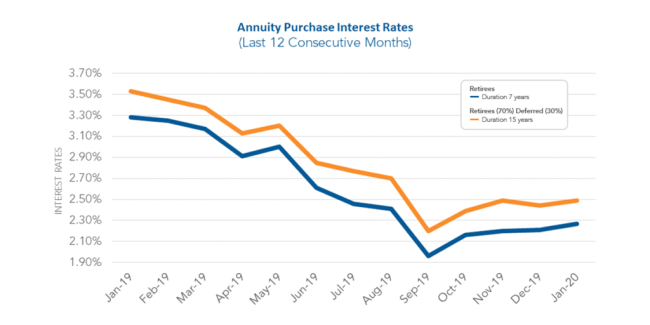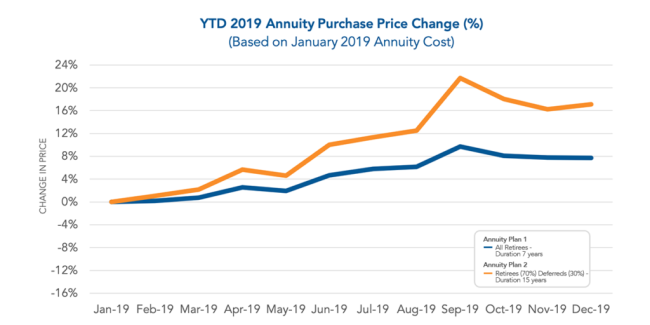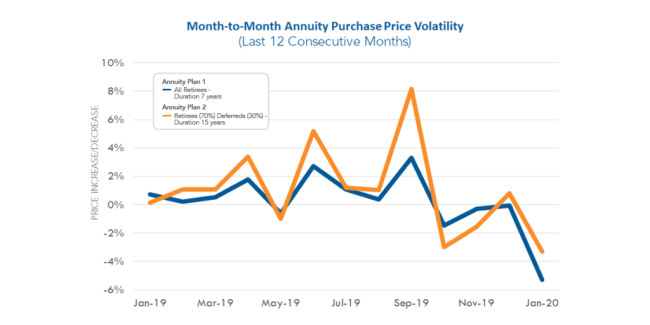
Annuity Purchase Update: January 2020 Interest Rates
January 2020 | |||||
Duration: | 7 Years | 15 Years | 7 Years | 15 Years | |
Range Rate: | 2.12% – 2.45% | 2.34% – 2.63% | Average Rate: | 2.27% | 2.49% |
As mentioned in our December 2019 Pension Finance Update, pension plans continued to see an increase in funded status during this last quarter of 2019. Also, the equity market has experienced tremendous returns during 2019 and these returns have largely offset liability growth due to drops in interest rates. The average duration 7 annuity purchase interest rates and average duration 15 rates have both increased by roughly 30 basis points since September 2019.
This increase in rates since September led to a corresponding decrease in annuity purchase prices of approximately 7% for both Annuity Plan 1 and Annuity Plan 2. The activity of plans purchasing annuities remained constant throughout 2019 and then dramatically increased in the fourth quarter. During our experience, insurers priced annuity purchases in 2019 aggressively and insurers are continuing to do so at the start of 2020.


History demonstrates annuity purchase interest rates fluctuate over time with varying degrees of peaks and valleys. The last few months we’ve observed an upward trend in both duration 7 and duration 15 annuity purchase rates. Since last month, duration 7 rates increased 6 basis points and duration 15 rates increased 5 basis points. Plan sponsors should consider getting their data in order for a Pension Risk Transfer.
Implementing a Pension Risk Transfer strategy can help a plan sponsor fulfill organizational goals, including reducing volatility in financial disclosures due to volatile interest rates.

The spread of annuity purchase prices above the GAAP projected benefit obligation (PBO) remained fairly stable during 2019. This spread was around 3% for Annuity Plan 1 and 11% for Annuity Plan 2. When annuity purchase interest rates and yield curve interest rates changed rapidly throughout 2019, the spread fluctuated slightly up and down for both plans.
From December 2019 to January 2020, the spread increased for both Annuity Plan 1 and Annuity Plan 2. This spread increase is in part due to adoption of the new Pri-2012 mortality tables and MP-2019 mortality improvement scales in January 2020, which generally lowered GAAP liabilities. Relative to GAAP, we have seen that an increase in annuity purchase rates generally lowers annuity purchase prices. A narrow spread may represent an opportunity to settle an annuity purchase at a relatively cheaper price compared to a broad spread.
Keep in mind that the below PBO calculations exclude future overhead costs paid by plan sponsors to retain participants in the plan. Administrative expenses and PBGC premiums are examples of these overhead costs. Future overhead costs would narrow the spread, though the extent is plan specific.

This past year, a significant month-to-month cost volatility has persisted. Timing an early entrance to the insurance market is a crucial part of the planning stage because of the consistent short-term volatility of annuity pricing. Sponsors can take advantage of favorable fluctuations in a volatile market by connecting with an annuity search firm early.

Looking ahead to future plan years, per our December Pension Finance Update, PPA funding relief will gradually sunset and this will generally lead to increased contributions from plan sponsors. Plan sponsors may wish to use these contributions to reduce the plan’s overall liability through use of a Pension Risk Transfer.
In 2020, the PBGC Flat-Rate Premium will increase to $83 per participant, the Variable-Rate Premium will increase to 4.5% of unfunded vested benefits, and the Variable-Rate Premium Cap will increase to $561 per participant. As shown in the 2019 PBGC Premium Burden Report, PBGC premiums remain a major threat to pensions, and continued attention to premiums should be a central part of viable pension management for the foreseeable future. Through use of a Pension Risk Transfer, plan sponsors can eliminate or significantly reduce future PBGC premiums.
In October 2019, the Society of Actuaries published (1) a new Mortality Improvement Scale MP-2019 and (2) new base Pri-2012 Mortality Tables. Both the MP-2019 and Pri-2012 will generally reduce defined benefit plan liability valuations marginally.
Have a pension risk transfer need but not sure where to start? See our article, What to Look For in an Annuity Search Firm.
*October Three collects annuity purchase rates for Duration 7 years and Duration 15 years from several insurers on a monthly basis. We have constructed 2 hypothetical annuity plans which have been valued using the latest mortality tables. Annuity Plan 1 contains retirees only and has a liability duration of 7 years. Annuity Plan 2 contains 70% retirees and 30% deferreds and has a liability duration of 15 years. Using the collected annuity purchase rates and 2 hypothetical annuity plans, we have produced the following graphs representative of actual 2019 and 2020 Pension Risk Transfer market activity and the corresponding impact on pension plans.
